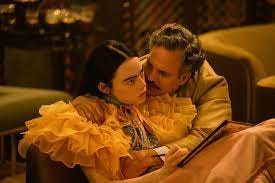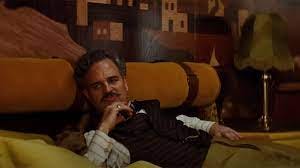Poor Things (2023) by director Yorgos Lanthimos is the story of a young woman's journey to independence in a fantasy-inspired Victorian era. It has been nominated for eleven Academy Awards, including Mark Ruffalo as Best Supporting Actor for his portrayal of Duncan Wedderburn.
It's not surprising that I loved Wedderburn's deeply flawed character. In the way that Ken added so much emotional conflict to Barbie, lawyer Duncan Wedderburn was a flawed mess in Poor Things. Flawed characters make great stories. We’re going to take a look at how his character added so much to this movie.
Relationships are messy by nature; it's a human condition. The good news is that we, as storytellers, can mine all that for our creations. The vehicle for this mining is tropes. Before we get to that, here’s a quick review of the Poor Things plot.
Bella is a creation of a mad scientist who put the brain of her unborn infant into her body when her mother killed herself. The story is about Bella's experiences from a child to an independent woman, focusing on the characters she encounters in her journey.
Poor Things is an excellent example of Complex Characters. Simple Plot. It is packed with tropes: antagonist, across the tracks, alphahole, boss, the con, family, forced proximity, found family, fish out of water, hidden identity, mistaken identity, opposites attract, politics, playboy, profession, quest, reunion, scar, secret, ticking time bomb, woman in peril, violence, ugly duckling, unrequited love.
Since we will focus on Duncan Wedderburn's character, let’s look at his goal, motivation, and conflict.
Duncan’s goal is to simple-- he wants to seduce Bella. His motivation is his desire to control her through sexual experience. His conflict is discovering that Bella is beyond his control.
Let’s see how the alpha hole defines Duncan Wedderburn and how the unraveling of his trope defines his character's eventual breakdown.
What is an alphahole? This trope is an individual with arrogance and assertiveness about power. They are also known as cads, rakes or entitled jerks, charm isn’t required. They employ their wealth, knowledge, and advantages to get what they want. They can be physically imposing, but it's unnecessary; their power comes from what they own. Alphaholes are popular in romance genres but I love seeing it used outside that genre here. A traditional alphahole example is Mr. Rochester from Jane Eyre.
In Poor Things, the alphahole is not redeemed by love, he is undone by it. And that is the delicious twist of this trope we will look at now. As I mentioned above, there are many tropes at work in Poor Things, but I’m most interested in looking at the alpahole. That said, can you see other tropes working with this trope such as opposites attract, politics and forced proximity?
The Trope Thesaurus Series Five Points to Scene Creation with the Alphahole Trope:
1) Set Up: This is where you introduce the trope to your audience in character thought, action, or dialogue. But you are planting the seed in your audience’s mind that this trope matters in the story.
We first meet Duncan Wedderburn in Bella’s creator/father Godwin’s study, drawing up the paperwork for Bella’s marriage to his docile lab assistant Max. Wedderburn is a lawyer; the contract language incites his prey-hunting instinct, and he searches for Bella.
His elaborate suit, roving hands, and eyes show him as a man who is confident in his world. His flowery speech is tinged with a languid lisp as he promises to free Bella from her confined world to one of sexual experimentation.
2) Showtime: Right here, we see the trope in action. This will be at least one scene, but multiple scenes usually increase conflict in practice. It will be the meaty part of the story for a solid story-wide trope. It's the heavy lifting of the chosen trope.
Wedderburn’s self-satisfaction doesn't last long once he and Bella are in Portugal. His first inkling that things may not go as he predicted comes after three bouts of furious jumping (Bella’s word for sexual activity). She requests an encore, and Wedderburn tells her that male physiology requires a rest.
Bella’s observation that this is a male defect gives Duncan pause. Of course, it's not a defect; it's a just, well, what is it? He's never thought about it before. However, he brushes away his uneasy thoughts only to be met by increasingly unconventional behavior by Bella.
As Wedderburn sleeps, Bella wanders Portugal on her own. She has sexual activity with others to satisfy her curiosity. Wedderburn is incensed by her behavior, imploring her to behave politely—even telling her what to say.
While his control over Bella weakens, his attraction to her intensifies. He pulls at his hair and paces the floor while she is gone. He delights in her uninhibited dancing but begins a brawl out of jealousy.
He wants to return to England to marry her, thinking that will restore his domination, but Bella refuses. She restates her plan to marry Max after her period of experimentation ends.
Wedderburn removes her from Portugal via a locked box to a cruise ship, sure that the forced proximity will make Bella more malleable. But Bella’s exploration moves beyond sexual activity into intellectual and moral reasoning when she meets two new friends.
As a result of her newfound love of reading and thinking, Wedderburn begins drinking and gambling as Bella loses interest in him. His attempts to control her and met with increasing resistance.
3) Reveal: The trope is revealed to the character(s) in a way that a significant decision/action is required by them.
Wedderburn has no money or means of controlling Bella when she gives all his money away.
4) Fallout: This is the result of the decision.
With no money, the pair are put ashore. Bella exchanges sex for money to help them. To her, this is a practical decision. Wedderburn is distraught, cries, and calls her a whore. She gives him money to return to London. She is tired of his dependency and wishes to be rid of him.
5) Resolution: This is how the decision plays out long term.
Wedderburn is in an asylum, having broken with reality. He prevents her from marrying Max by contacting the man who was married to her mother before her suicide.
What I love is that we see the transformation of this alphahole character arc play out before us. The director and actors did a great job showing us scene by scene how the alphahole trope breaks down. When we are building or revising our characters, thinking through the story with a the five step system I mentioned above is a way to implement the show don’t tell mantra in storytelling. Think of it as a way to check your work on the have I delivered to the audience what I as storyteller promised worry that often plagues us. Then continue on with being a storyteller!





